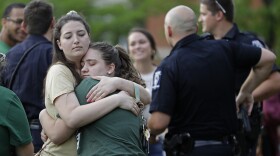In the wake of the shooting at the K-12 STEM School in Highlands Ranch, Colorado, parents all over the country are struggling with difficult conversations about safety at school.One student was killed and eight were injured. Hundreds more lived through the terrifying experience of a shooting at their school.
The reality is that school shootings are traumatic events. And they can have long-lasting consequences.
We reached out to Robin Gurwitch, achild psychologist at the Duke University School of Medicine who studies resilience in children after trauma, to find out what parents can do to help their kids in the days, weeks, months and even years after.
The First Day
As tempting as it may be to avoid the topic, especially if your child seems fine, Gurwitch says, it’s crucial to talk to your kids. “The very first and most important thing for families is to actually talk about what happened,” said Gurwitch, “and to have the conversation.”
She encourages parents to ask kids to “Tell me what you’ve heard?” over providing information to get the conversation started. This helps parents understand how aware their children are of the incident but also allows parents to gently correct misinformation they might have picked up.
“It would be great if we could say ‘Oh don’t worry about it. Don’t feel that way.’ But that’s unrealistic. So we have to make sure that we support them but to let them know our own feelings,” Gurwitch said. “It’s alright to say, ‘This makes me worried or this makes me scared or this makes me angry, but here’s what we’re going to do. Here’s how I’m going to cope with it.”
After a shooting, children, no matter the age, can feel unsafe. Gurwitch suggests going over a safety plan with your child to help make them feel more secure.
Supporting Your Younger Children Vs. Teens
Gurwitch says children manifest stress and grief in different ways.
One thing to keep in mind is their consumption of the news around the shooting. “Young children really should really not be exposed to the media coverage at all,” Gurwitch said. “I think that is a real developmental difference.”
Though a child may be occupied with something else while the TV or radio is on in the background, they may be picking up information about the shooting.
Older children can watch news coverage, but parents should limit their exposure and avoid letting them watch for hours at a time.
» RELATED | Go to more Guns & America stories
After watching or hearing a news segment about the shooting follow it up with a conversation about the incident, Gurwitch says, and ask how they feel about it. Encourage your kids to ask questions.
“This is a time when anxiety is high,” Gurwitch said. “Communicate and let your child know that there are supports around. There are good people everywhere.”
Be Mindful Of Triggering Events
Even months after an incident, children may be dealing with grief and anxiety. “We do respond and heal at different rates,” Gurwitch said.
Parents should be aware of anniversaries or other events similar to what the child experienced as those events could bring back memories and emotions from the incident they went through.
“Caregivers need to circle back repeatedly,” Gurwitch said. “You can just tell your children, ‘I care about you, so I’m going to keep checking back just to make sure. And at any point if you want to talk to me, I want you to know that I’m available to talk.’”
More Resources For Families
For more on how to help support your child after a school shooting, check out the following:
- How To Talk To Your Kids About The STEM Shooting, Denver Post
- National Child Traumatic Stress Network
- Talking To Kids About Violence In the News, But Why: A Podcast For Curious Kids
- Victim Services, FBI
- Talking To Children About The Shooting, NCTSN
KERA is part of Guns & America, a national reporting collaborative of 10 public media newsrooms focusing attention on the role of guns in American life. You can find more Guns & America coverage here, and learn more about the collaboration here.






